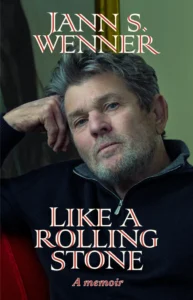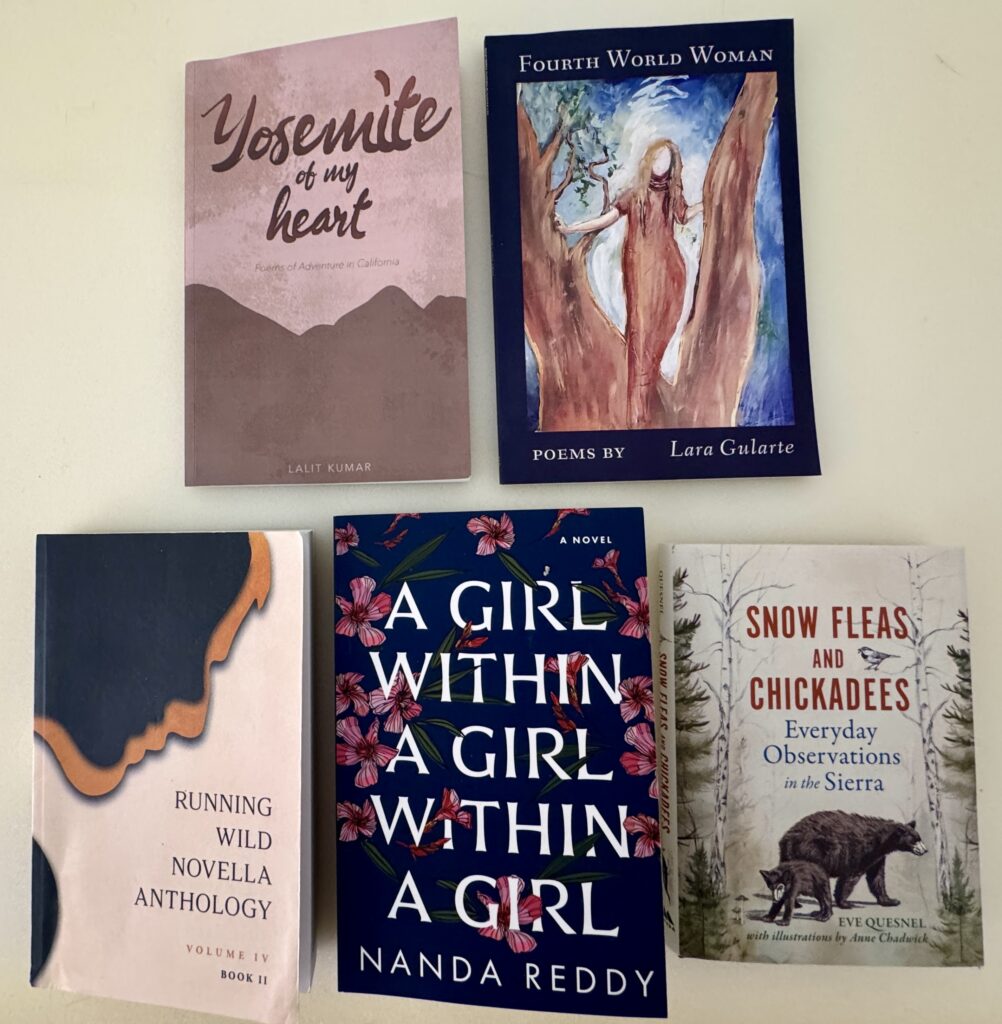
Tahoe Literary Festival October 2025. Books we picked up as we chatted with authors.
Coming in November: Lalit Kumar poetry from his above adventurous book, Yosemite of my Heart.
BOOK REVIEWS
“The inside story of the ‘world’s greatest rock and roll band magazine.’ ©MillValleyLit. Warning—This book will give original RSM fans flashbacks and make their noses itch…
…and envy of Wenner’s accomplishments and the cool people he could hang out with (Hey, Mick, oh, Jackie O and Bono. Oh oh, Belushi-o). Along with nostalgia for the glory days of rock and some regret at how naively idealistic and drug-addled our generation really was.” —MillValleyLit
A historical view by this epicentral character in the rise of R&R, pop-culture and counter-culture. Jann Wenner (Yahn Wen-ner) makes it clear that his allegiance to his 60’s generation rebellious political ideals was, and is, as zealous as to the rock rebels he promoted. Since co-founding in 1967, the 23-year-old upstart’s magazine entrepreneur brilliance and success was obvious. His magazine’s influence and importance in general, and specifically in the legitimization of Rock & Roll as an art form, cannot be overstated.
16 (1957), FliP (1964), Tiger Beat (1965) were teen (mostly girl) fan zines whose most probing question to heartthrob stars was “What are your favorite colors?” The best titillating reply perhaps was never given: “Blonde and tan.” Teen Beat started 1967, the same year as RS. The more respectable fan zine, Crawdaddy was started by a 17-year-old in 1966, a year-and-a-half prior to Rolling Stone. Creem appeared in 1969, named for the band Cream, but the founders were legally savvy enough to alter the name. What they did not predict is that some shops would mistakenly place Creem next to Screw in the porn section.
Wenner’s obsession with glamorous rock gods and celebrities, and their lifestyle, would give him more intimate knowledge of them than the “Plaster Casters,” to soon transform himself into a certified celebrity.
Only peer Hugh Hefner was a more famous publisher\celebrity than Wenner. For almost fifty years, Rolling Stone was as cool as you could get. It was IT. And only People magazine would out-circulate Rolling Stone —and to Wenner’s continuous dismay, out-circulate his US Weekly, published later to directly compete with People.
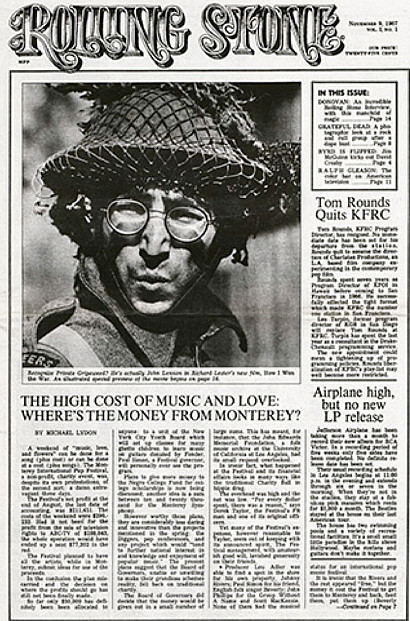
Wenner’s uneven reportage, vignettes, and long paragraphs dart over many years and many pages of his memoir—560 including 63 photos—through this larger-than-life man’s innumerable events, concerts, parties, highs, exotic vacations, and stars—stars who were all Jann’s “great friends” in the World According to Jann. Kiss-and-tell reveals, self-deprecating passages, and frank remarks appear regularly, as required for a best-selling memoir, with a few extra to boot. Not surprising for a man who’s publication’s tell-all “integrity” pissed off a lot of people, including his “great friends.” (In former RS writer Cameron Crowe’s spot-on movie, Almost Famous, a musician repeatedly calls the Stone reporter “the enemy.”)
But the fact that a coveted “Cover of the Rolling Stone” could lead to millions of dollars, millions of album sales, or a stay in the Oval Office made a symbiotic relationship irresistible.
Event years are often lacking, recollected vaguely by mature readers, while leaving younger readers, if there are any, wondering. After introduction of the myriad characters, last names are also often later lacking, leading to some back-flipping or never-minding.
Wenner’s often delightful descriptions include a typical Keith Richard kinetic entrance as, “…so much in motion him: earrings, bracelets, rings; things twisted into his hair, headband, and hat; shirt unbuttoned; scarves, beads, and necklaces, plus a belt with a skull or something similar.”
Wenner’s magazine rock coverage would add more and more pedantic-sounding political sermons (one-aisled). Bob Dylan announced Jann, in the audience of a Beacon concert crowd, as “publisher of Rolling Stone. That’s the magazine of sex, drugs, and… politics.” Readers who have turned more conservative as adults may cringe at sections of his memoir, such as his chapter “Fuck the NRA.”
High light Reel
Drug use was unabashedly rampant with the Stone-ers and friends, but no surprise there— hey, it was the 60s. And the seventies. And the eighties. And everybody he knew was rich. And “cool.” Humorous anecdotes include alpha-dogging with “bully” Bill Graham, and the heated office controversy: is disco worth covering and does Donna Summer really deserve the cover. Wenner insisted, yes. Wenner grew up privileged in San Rafael, Marin County, CA. His mother was a founder of Marin Country Day School. Famed portrait photographer Annie Leibovitz studied at San Francisco’s Art Institute before her start at Rolling Stone at barely age twenty-one. Mick Jagger and lesbian Annie’s relationship??
Coming out, after marriage and three children, about his repressed homosexuality. Jann’s and Mick’s uneasy, ongoing legal relationship over the the name “Rolling Stone” despite its previous original use by Muddy Waters and (an also disgruntled) Bob Dylan. Because of the rampant drug use and the Stone “lending library” of drugs for the staff, perhaps Wenner should have gone with Rolling Stoned.
The MIck & Jann relationship was further extinguished for a year by Wenner leading and continuing the crucification of Jagger for the Altamont concert debacle. He provided no sympathy for the devil, while casting no shade on the Grateful Dead and Garcia in particular, who proposed hiring their friendly neighborhood Hells Angels for security—without any efforts to train or restrain them. Wenner makes no mention of the gun in the hand of the murdered man, Hunter, aiming at the stage, and his witnessed murderous intent.
Eventually forgiven, Wenner recounts, much later vacationing, on some private exotic beach around the campfire, with “great friend” Mick strumming guitar and singing, “You Can’t Always Get What You Want.” Or can you, Jann?
If it wasn’t for Wenner, the outrageous and certifiably Gonzo, Hunter S. Thompson’s best books, the two Fear and Loathing in… would not have happened.
And probably neither Tom Wolf’s The Right Stuff or possibly Bonfire of the Vanities. Wenner was a leader in establishing the Rock and Roll Hall of Fame. Vaguely rememberable, Wenner was in a couple of movies, cameoed in Almost Famous, and in Michael Mann’s superb TV series, Crime Story. (Mann’s darker, and arguably better, follow-up to his groundbreaking pop-cultural hit, Miami Vice.)
The Bonus insider info not in the book: Jann Wenner escorted our friend Lisa’s older sister, Susan “Simone” Kent “when they were both still ugly ducklings,” to Susan’s senior prom in San Francisco at Washington High.
Note that Wenner and his RSM received criticism over the years as a boys’ club, and the covers and coverage as being male and white-centric. Wenner’s awkward NYT interview comments, in September 2013, confirmed his attitude with much backlash including from his son Gus, current CEO of RSM, and Wenner’s removal from the board of the R&R Hall of Fame which he helped form. RSM was acquired by Penske Media Group in 2019.
Despite this review’s somewhat negative and jealous slant, we give Like a Rolling Stone a “Recommended Read.” Published Sep 13, 2022 by Little, Brown and Company.
For another insider look at Rolling Stone Magazine wild San Francisco office, Wenner, Hunter S. and Joe Eszterhas, and Cameron Crowe, see J.Macon King’s interview with former Stone staffer, in From the 60’s to the ‘9ers with David Harris.
Centennial Edition of Ground-breaking Kerouac Bio
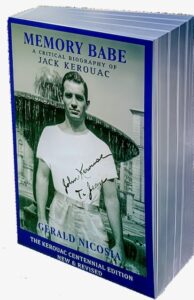
When Gerald Nicosia’s Memory Babe first appeared from Grove Press in 1983, Library Journal wrote: “To call this book the definitive Kerouac biography is an understatement … [it is] all-inclusive and richly detailed. The reader’s immersion in Kerouac’s thoughts, moves, and mess-ups is so total that one cannot but feel a great empathy for him. The reader is completely immersed in Kerouac’s thoughts, actions, and blunders, and one cannot not but sympathize with him….”
Now there is a revised and expanded edition, to celebrate the 100th year of Jack Kerouac (1922-1969).
MEMORY BABE: A Critical Biography of Jack Kerouac, by Gerald Nicosia. The Kerouac Centennial Edition. New and Revised, with Introduction by R.B. Morris. Noodlebrain Press. 841 pages, with index and photos.
Jack Kerouac, the writer dubbed “King of the Beats,” passed away in 1969 at the age of forty-seven. His literary influence has progressively expanded since his legendary lifestyle and one-of-a-kind creative skill made him a hero throughout his lifetime.
Gerald Nicosia presents us with a brand-new edition in 2022 of his award-winning biography of the writer. It is a recently updated version of his detailed biography of Jack Kerouac — “Memory Babe,” a childhood nickname referencing Kerouac’s outstanding recall.
Many unique and personal pictures, never published in the earlier edition, are included in this collection, along with corrections and new material: the author’s relationship to Jack’s daughter, writer Jan Kerouac, Jack’s ancestry, the “Joan Anderson Letter,” the Six Gallery readings, Jack’s mental state, his breakthrough into postmodernism, more details about his family, life in Florida, death, and controversial estate.
by Carl Macki
From previous issues:

Circus of the Sun
MillValleyLit publisher J.Macon King’s debut novel of 1979 San Francisco’s cultural, sexual and political maelstrom. Available from Amazon.
In the wake of his girlfriend leaving him, young musician Jack has sworn off women, yet the reforming bad boy cannot resist the incandescent, liberated artist Bretta and her creative entourage. The pair sense they have found their Masterpiece of Love—until the return of Bretta’s enigmatic friend unveils disturbing secrets.
“…an ambitious and poetic story of love and creativity. At times racy and poignant… King deftly includes details that bring the book’s characters and events to life.” —Pacific Sun.
“More than a love story, this is a portrait of the city of San Francisco… The prose leans towards the poetic, which results in gorgeous, Kerouac-ian vignettes…seeming like a movie played on fast forward…” Kirkus Reviews.
“A great, lyrical portrait of an era…a spot-on recreation about a great time of history…and I enjoyed the sheer trip of it. Beautifully observed writing—the emotions in the story are true and moments of life are rendered with clarity.” —Louis B. Jones, author of four New York Times Notable Books, including Ordinary Money and Particles and Luck.
“…sets forth a story-within-a-memoir so skillfully that you forget this is a work of fiction. …Captures the ups and downs of an intense relationship deftly. —Rick Dale, The Daily Beat. Full review at: https://thedailybeatblog.blogspot.com/2020/10/book-review-circus-of-sun-by-jmacon-king.html
Buy Circus of the Sun on Amazon $19.95.
Also from J.Macon King:
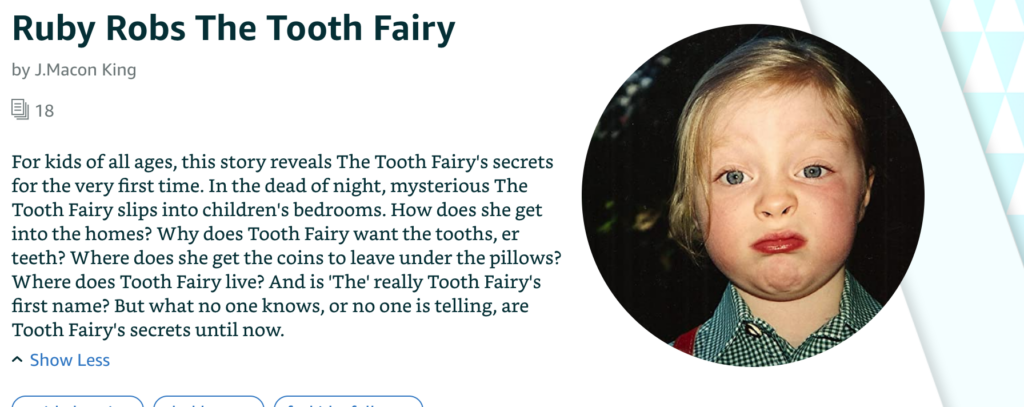
If you, and/or your children, enjoy the semi-dark, mischievous fantasies of A Series of Unfortunate Events, Roald Dahl, and Harry Potter, take a look at King’s short novel, Ruby Robs The Tooth Fairy. The first three episodes are free on Vella.
Like what we do? Please support writers and help keep MillValleyLit ad-free. Donate at this PayPal link: PayPal.Me/yeslpk or with Venmo: perry-king-5. Subscription info here.
From previous Issue #22:
AUDIOBOOK REVIEW
 review of
review of 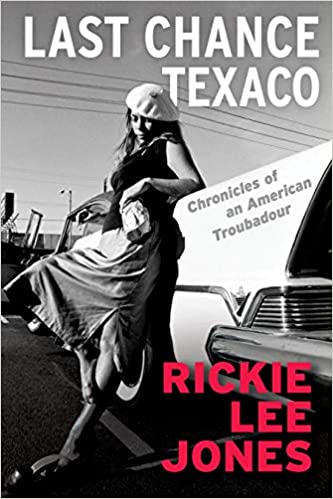
Simon & Schuster Audiobooks
This is a Boomer’s story if there ever was one.
Rickie Lee Jones, born Nov. 8, 1954, chronicles her awakening to the musical revolution of the sixties and seventies like many Boomers might, sharing the ear-opening moments that led to her own distinctive artistry. And, like many Boomers, RLJ was a teenage runaway, a hippie hitchhiker drawn to the sirens of the road before she even had a driver’s license. It is this life, prior to her famous dalliances with Tom Waits, Lowell George and Dr. John, and the Grammys that came later, that shaped the inimitable experiences that weave throughout her songs.
And she just happens to be a damn good storyteller. Once you get used to her narrative voice sounding a little bit like Granny from “The Beverly Hillbillies,” her pre-fame story is so completely enthralling you might wonder how she lived to tell it.
And tell it she does–caterwauling, singing, chuffing, laughing, snorting–like no audiobook you’ve ever heard. Her energy and enthusiasm draw you in, as if you were sitting in Danny’s All-Star Joint having a cig and pint of Hiram Walker.
As the Amazon blurb says, “This troubadour life is only for the fiercest hearts, only for those vessels that can be broken to smithereens and still keep beating out the rhythm for a new song.” Sounds like RLJ might’ve penned that thought herself.
Okay, so I’m a fan. Back in ’79 when I first heard “Weasel and The White Boys Cool” I thought it was one of the slinkiest, greasiest grooves ever. Just recently I listened to an obscure 1997 release, “Ghostyhead,” a fearless foray into digital, synthesized electronic sounds. Her adventurer’s spirit is as intact as it was when she was a teen runaway.
You don’t have to like RLJ’s music to enjoy Last Chance Texaco. It is both timely and timeless: a girl’s coming of age, relishing independence, taking whatever risks are necessary to realize her sonic vision. And she’s still at it, bless her wild heart!
One Simple Thing, by Warren Read
Highbridge Audiobooks
You’ve probably never heard of Warren Read. The only reason I know Warren is ‘cuz we were classmates at the Rainier Writing Workshop, Pacific Lutheran University’s MFA program, and I was lucky enough to be on the team that read his brilliant creative thesis, subsequently published as Ash Falls. It hasn’t made it to audiobook, yet, but it certainly deserves it.
Warren’s second novel, One Simple Thing, was released as an audiobook, and though I can’t say I was thrilled with Joel Richards’ narration, the story is a gripper. Like Kent Haruf’s trilogy about eastern Colorado ranchers and townsfolk, One Simple Thing paints a stark, disturbing picture of backwoods, rural living and some of the twisted two-bit criminals that sometimes inhabit that world. The narrative is peppered with wonderful metaphor and tiny details that, in cinematic fashion, create palpable, unforgettable imagery.
Like Richard Ford’s protagonist in Canada, the plight of young, quiet Rodney Culver, bewildered by his parent’s breakup, creates a tension that tugs at the heartstrings. As Rodney is slowly drawn into a vague criminal enterprise by his mother’s fry-cook boyfriend, we can’t help but pray that the 12-year old gets through the mess unscathed.
As I mentioned, the narration takes some getting used to; lotsa whispering whiskey voice. But it is the expertly crafted slow burn of the plot, along with reticence and hopelessness of these small-town characters, that makes One Simple Thing an understated masterpiece.
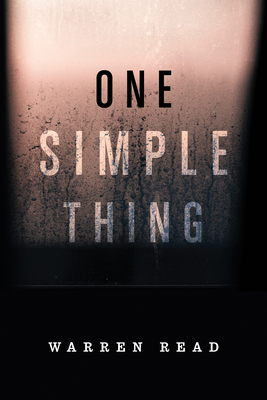

From previous Issue #19:
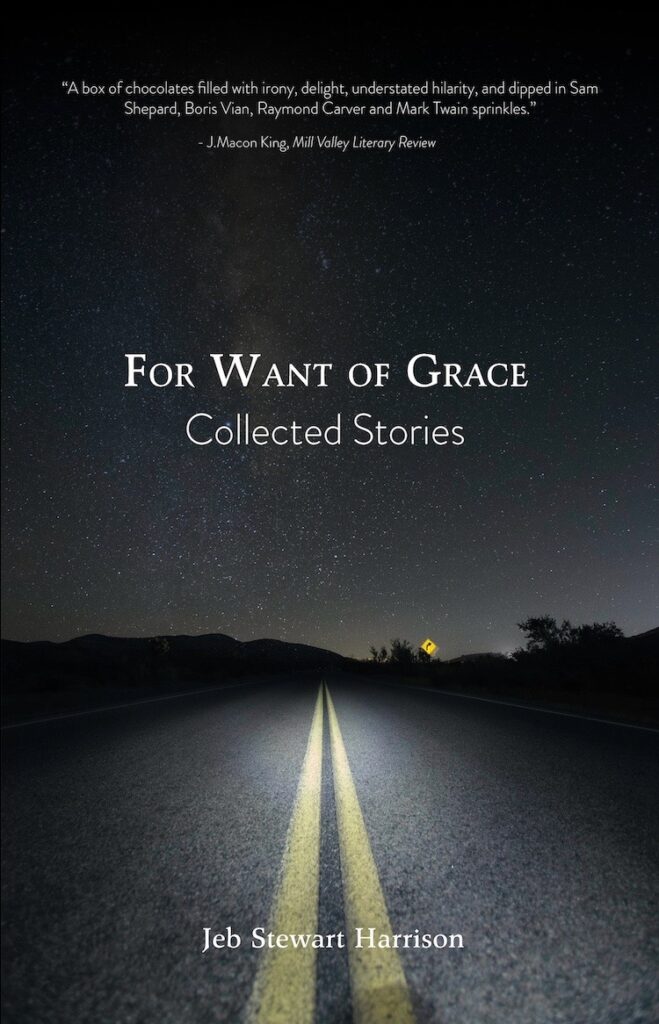
“A box of chocolates filled with irony, delight, understated hilarity, and dipped in Sam Shepard, Boris Vian, Raymond Carver and Mark Twain sprinkles.” — Mill Valley Literary Review
Coming soon from Baby Bingus Books & Beats. MillValleyLit’s Humor and Audiobook Columnist Jeb Harrison’s book of short stories is coming soon. For Want of Grace: Collected Stories is a collection of short fiction that is, like the author, all over the place (writer, musician, artist). Beginning with an homage to the transformational power of the Hammond B3 organ, the stories range from silly to maudlin, whimsical to terrifying, hilarious to melancholy, each punctuated with Harrison’s cinematic, lyrical prose. From lizard tail soup to chance meetings with mountain lions, “necro-rhetoricians,” horny geriatrics, junky priests, murderous toll-takers and superheroes in the boardroom, For Want of Grace: Collected Stories will have you slapping your knee one minute and bawling the next. For more, please visit Babybingusbooks.com and amazon.com/author/jebharrison.
Jeb Stewart Harrison is the author of three novels: Hack, 2012. The Healing of Howard Brown, winner of the 2017 Independent Press Award for Literary Fiction and the 2020 Firebird Award. American Corporate, 2019 Independent Press Distinguished Favorite.
